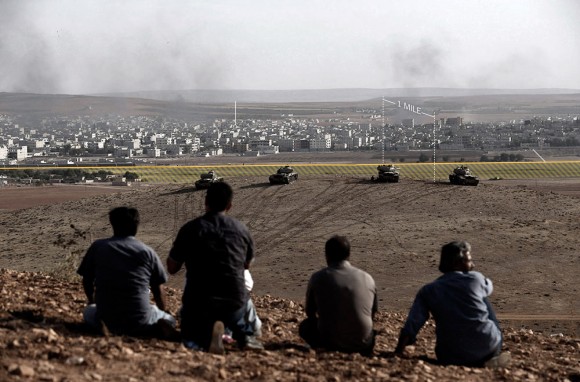Turkish fighter jets struck Kurdish insurgent positions in southeastern Turkey on Monday, shaking the country’s fragile peace process with the Kurds and demonstrating the complexities surrounding the American-led coalition fighting the Islamic State, which Turkey is under heavy pressure to join.
Turkish news reports said the strikes had been aimed at fighters of the Kurdistan Worker’s Party, known as the P.K.K., and were in retaliation for the shelling of a Turkish military base.
Such airstrikes were once common, as Turkey fought a Kurdish insurgency in a conflict that claimed almost 40,000 lives over nearly three decades. But hostilities essentially ceased two years ago when the peace process began, and both the Turkish newspaper Daily Sabah and an online statement from the P.K.K. said the airstrikes on Monday were the first since then. The Turkish military also released a statement, but it did not mention airstrikes specifically, only an exchange of fire with “terrorists.”
The action is likely to reverberate far beyond Turkey’s borders, and raise further questions about Turkey’s willingness to take on what the United States and many experts say is a much greater enemy, one that should unite the Turks and the Kurds: the extremists of the Islamic State, also known asISIS or ISIL, who have taken control of large parts of Iraq and Syria.
In Syria, the Kurdish city Kobani, just over the border from Turkey, has been under siege by the Islamic State, prompting calls for intervention by the Turkish military, which has positioned troops nearby. Nearly 200,00 refugees have fled into Turkey from the city. The Turks, though, have been reluctant to step in militarily, because the fighters defending Kobani belong to an offshoot of the P.K.K.
The group, called the Democratic Union Party or P.Y.D., has carved out a measure of autonomy in some parts of northern Syria amid the chaos of the civil war there, and Turks see it as a security threat to Turkey.
Even before the airstrikes, Turkey’s unwillingness to do more to relieve Kobani, despite pressure from the United States and other countries, had spilled over into the streets of Turkish cities, where more than 30 people were killed last week in violence surrounding protests.
The Kurds have not sought Turkish military action in Kobani, but have pressed for Kurdish fighters to be allowed to pass through Turkish territory to join the fight in Syria. After the street protests, Kurdish leaders appealed for calm and for the continuation of the peace process, and tensions have eased for now.
The Turkish prime minister, Ahmet Davutoglu, reiterated to Parliament on Tuesday that the international coalition against the Islamic State must also take on the toppling of the Syrian government of Bashar al-Assad. “Turkey is against both ISIS and Assad,” he said.
He also sought to separate the situation in Kobani from Turkey’s efforts to make peace with Kurds in Turkey.
“I’m telling those who try to build a relationship between Kobani and the peace process – these two are different from each other,” Mr. Davutoglu said. “The peace process was there before Kobani, and saying so doesn’t mean that we do not think of Kobani as important.”
He added, “the peace process will continue with determination.”
Correction: October 14, 2014Because of an editing error, an earlier version of this article referred incorrectly to the timing of the Turkish airstrikes on Kurdish positions. They took place on Monday, not Tuesday.
Sebnem Arsu contributed reporting.
